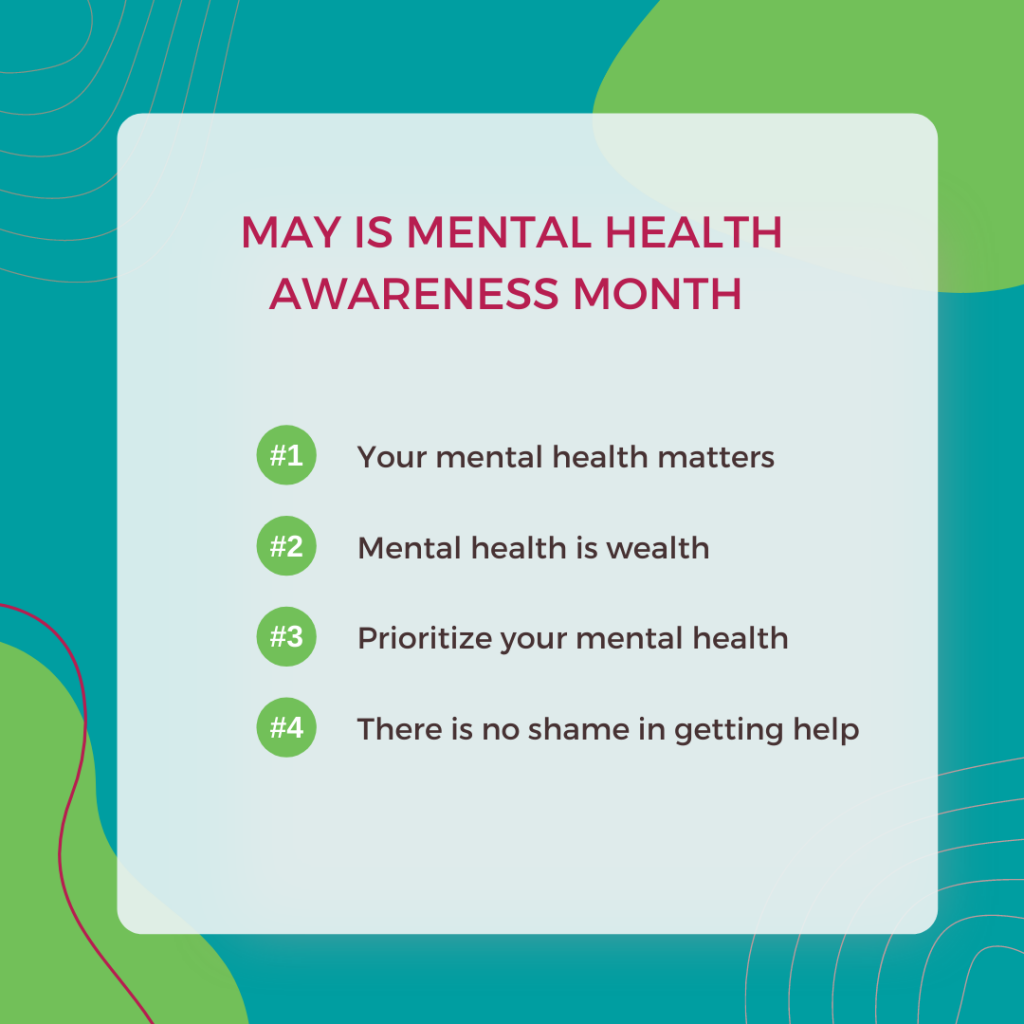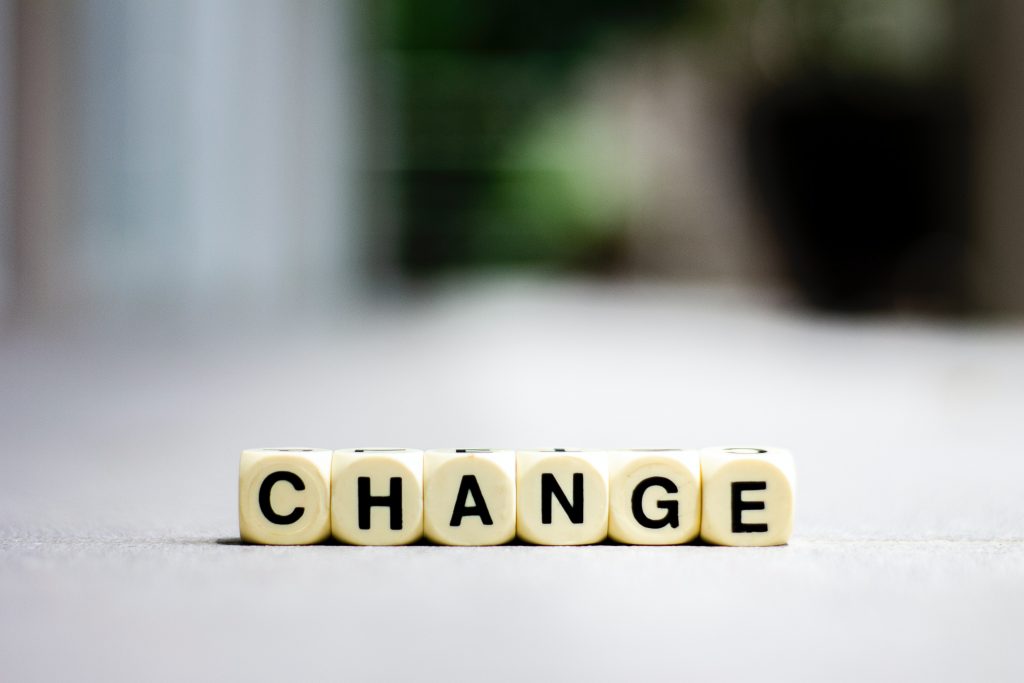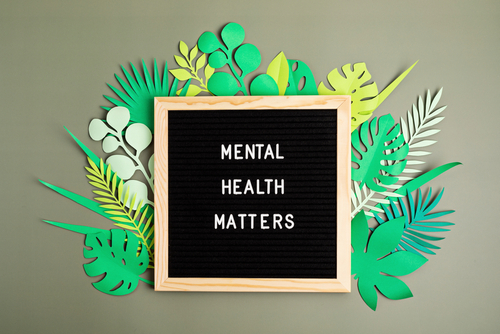Mental Health Awareness Month
As the last day of May quickly approaches, bringing with it an end to Mental Health Awareness month, I have been reflecting on what we need to do to promote positive mental health and destigmatize mental illness in this country. We need to incorporate mental health into the fabric of our lives, improve access to preventative mental health services and treatment, and eliminate stigma.

Distinguishing Mental Health and Mental Illness
Mental health and mental illness, terms often used interchangeably, are quite different. We ALL have mental health, and we must all nurture, cultivate, and protect it. Mental health, as defined by the World Health Organization (WHO), is “a state of well-being in which the individual realizes his or her own abilities, can cope with the normal stresses of life, can work productively and fruitfully, and is able to make a contribution to his or her community.” Protecting our mental health requires practices such as getting adequate sleep, regular physical activity, pursuit of purpose, implementing boundaries, developing healthy coping skills, building resilience, learning to love our authentic self, self-care, and human connection.
Mental illness, on the other hand, is a brain disease that affects an individual’s feelings, thoughts, mood, and behaviors and negatively impacts his or her ability to navigate life including school, work, and relationships with others. The brain is so complicated that there are no specific blood tests or imaging studies that can definitively diagnosis a mental illness. Rather physicians and other mental health providers examine constellations of symptoms and patterns of behaviors to identity and treatment mental disorders. Importantly, mental illness is no respecter of a person. That means no one is immune to mental illness irrespective of your age, gender identity, race or ethnicity, sexual preferences, socioeconomic status, faith, or political persuasion.
Incorporating Mental Health
Mental heal is something we all possess – that we all must nurture, cultivate, and protect. This is so important that I chose to repeat it. Our mental health influences every aspect of our lives – our innermost thoughts, our motives, our choices, our behaviors, our relationships, and our outputs academically and professionally. So, we should talk about mental health in our schools; in our churches, mosques, and synagogues; in our professional development workshops; and at our doctors’ offices. Why aren’t we having these conversations at home with our significant other and our children? Our mental health matters, so let’s start talking about it openly, honestly, and regularly!
Improving Access to Services
Although mental disorders are common, access to mental health services is problematic at best. There is a national shortage of psychiatrists and parity is lacking with paltry reimbursement rates for mental health providers compared to other medical providers. According to a 2017 report by the National Alliance on Mental Illness (NAMI) entitled, The Doctor is Out, there were several key findings:
- over half of respondents searching for a new mental health provider found that 55% of psychiatrists were not accepting new patients or 56% did not accept their insurance
- rates of difficulty finding a provider – 34% found it difficult to find a mental health therapist and 33% had trouble finding a mental health prescriber (MD, CRNP) compared 13% for specialty care and 9% for a primary care provider
- more mental health providers are out-of-network compared to traditional medical providers – 72% of mental health therapists and 79% of mental health prescribers vs. 7% of medical specialists and 3% of primary care which greatly impacts access to care and out-of-pocket costs for patients
Furthermore, reimbursement for mental health services require specific mental health diagnoses that must meet a certain level of severity and impairment. That means that children and adults who display warning signs of mood and anxiety disorders or who want to prevent the development of a mental disorder may not be able to see a mental health provider without paying out-of-pocket. Mental health prevention is often remarkably effective, and several studies demonstrate this finding, but insurance often fails to cover preventive services. We all need access to therapy and counseling services before crises arise, even in the absence of a major mental illness.
All this to say that people are not receiving the essential mental health services they need and deserve!
Eliminating Stigma
Stigma, as defined by the Merriam-Webster Dictionary, is “a mark of shame or discredit.” Despite the frequency of mental disorders in this country, affecting 1 in 6 children and 1 in 5 adults, those with mental illness are often ridiculed privately and publicly. People seeking and receiving mental health services are called crazy, bullied, shamed, and made to feel less than and inadequate. Society shuns those affected by mental illness, perpetuating dangerous stereotypes that depict them as wanton, violent, and subhuman. Such myths erase their humanity, the traumas they have endured, and the narratives characterizing all they have overcome, cruelly replaced by fiction and fallacies. Normalize seeing a therapist. View mental illness like we do physical illness, without assigning blame and worthy of addressing. Validate all emotional pain. Advocate and cover mental health days. Make it okay to not be okay.
Time for Change

The truth is if we want to optimize our own mental health and destigmatize the prevention, diagnosis, and treatment of mental illness, then we must CHANGE. CHANGE means
C – We must have the COURAGE to ask for help for it is when we admit our vulnerabilities that we receive our healing
H – We must choose HEALTH, “a state of complete physical, mental, and social well-being and not merely the absence of disease” (WHO). Diagnoses do not define us, nor do they preclude us from attaining wholeness and wellness.
A – We must take ACTION. No change will ever come if we fail to take action. No more sitting on the sidelines waiting for someone else to swoop in and rescue us. Call a therapist. Take the medication. Grow and evolve. Our mental health and the mental health of those we love as well as our fellow man/woman/child are always worth the fight.
N – We must say NO to negativity and the naysayers. Forget what they say. As the black feminist Audrey Lorde once said, “If you don’t define yourself for yourself then you will be crushed into other’s fantasies of you and eaten alive.” We got this for sure, but only if we are ready and willing to put in the work and cancel the opinions of irrelevant people.
G – We must chase GROWTH which requires courage and stepping outside of what feels comfortable. Remember that a seed is buried deep in the cold, dark ground; and it is only by pushing through the deep, dank earth will that seed bloom and bear good fruit. Our trials serve a purpose and often propel us into our destiny, but only if we grow through them rather than attempting to circumvent them.
E – For it is when we combine courage, pursuit of health, action, saying no to negativity and naysayers, and growth will we achieve elevation. Then we can powerfully change the conversation around mental health and mental illness in our communities.


